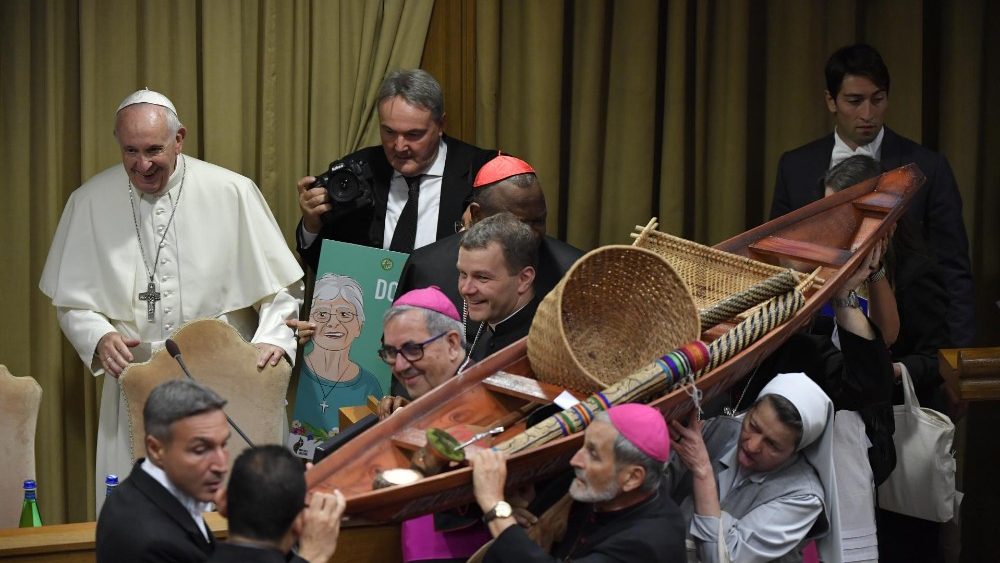Bogotá (Colombia), 03/06/2020, Sr. María Leonor Charria Angulo, OP.- Pope Francis published the Post-Synodal Exhortation entitled ‘Querida Amazonia’, (Beloved Amazon Region) on February 12, 2019, as the end result of the Synod of Bishops for the Pan-Amazon Region "The Amazon: New Paths for the Church and for an Integral Ecology held in Rome from October 6 to 27, 2019.
 He presents his "Dreams for the Amazon Region" and through them he wants to express the ideas which motivated him as fruit of the Synod, as well as to engage everyone in the care of these vast regions, because this land, as he well points out, is also 'ours'. In the first numbers of this document, Pope explains the meaning of the exhortation and specifies that he does not intend to substitute or repeat the Final Document and invites us to read it "in its entirety"; he hopes that the entire People of God will allow themselves to be "enriched and challenged" by it and that the Church of the Amazon region will be committed "to its implementation".
He presents his "Dreams for the Amazon Region" and through them he wants to express the ideas which motivated him as fruit of the Synod, as well as to engage everyone in the care of these vast regions, because this land, as he well points out, is also 'ours'. In the first numbers of this document, Pope explains the meaning of the exhortation and specifies that he does not intend to substitute or repeat the Final Document and invites us to read it "in its entirety"; he hopes that the entire People of God will allow themselves to be "enriched and challenged" by it and that the Church of the Amazon region will be committed "to its implementation".
Surely we have read all the 111 numbers in the Exhortation and have come to take different positions, have made comments and interpretations of this document. I note, with some concern, that two important and urgent aspects for the region of Amazon: the ordination of married men, the viri probati’ and the diaconate of women, have engaged and fixated our reading of the Exhortation, when it presents many other very valuable aspects. It is worth noting, however, that the Pope in his exhortation takes no position either for or against this request of the Synod of the Amazon region, presented by the Bishops of the region and which was accepted by a two-thirds vote in favor and one against... I hope that this possibility for the Church of Amazon region will remain open and be taken up again later.
Pope's dreams for Amazon Region
“All dreams can be reality, if the dream does not end. The reality is a dream; if we dream that the stone is stone, this is the stone…. Dream is the means which the soul has so that it will not escape the reality…” (Pedro Salinas, Don’t dismiss your dreams, Madrid Poet 1897-1951).
All dreams can come true, sings the poet and perhaps this way of conceiving dreams prompted Pope Francis to use them in his exhortation, but also a strong interpellation not only for the inhabitants of the Amazon region, but for all those who from various places in the world want to make these dreams come true. For Pope Francis there are four great dreams that the Amazon inspires:

A Social Dream (No. 8-27)
“I dream of an Amazon region that fights for the rights of the poor, the original people and the least of our brothers and sisters, where their voices can be heard and their dignity advanced.”
The first chapter of “Querida Amazonia” focuses on the "Social Dream". It stresses that "a true ecological approach" is also a "social approach"; it points out that the poor must be heard and that, in the face of injustice, it is necessary to "be indignant and ask for forgiveness"; for Pope Francis, "networks of solidarity and development" are necessary and he calls for the commitment of all, including political leaders. The last numbers of this first chapter are an invitation to the Amazon region to become "a place of social dialogue", first of all, "with the last ones". The voice of the poor, he warns, must be "the most powerful voice" in the Amazon region.
A Cultural Dream (N 28-40)
“I dream of an Amazon region that can preserve its distinctive cultural riches, where the beauty of our humanity shines forth in so many varied ways.”
The second chapter is dedicated to the "Cultural Dream". Pope Francis immediately makes it clear that "promoting the Amazon region" does not imply colonizing it culturally. Thus, he uses an image that is very dear to him: "the Amazonian polyhedron". It is necessary to fight against "post-modern colonization". For Pope Francis it is urgent to "take care of the roots".
Likewise, the Exhortation focuses on the "intercultural encounter". Diversity is not "a wall" but "a bridge". The last part of Chapter II is dedicated to the theme “Endangered cultures, peoples at risk”. In any project for the Amazon region, it is his recommendation, “there is a need to respect the rights of peoples”. These, he adds, can hardly “remain unaffected” if the environment in which they were born and developed "is damaged".
An Ecological Dream (N 41-60)
“I dream of an Amazon region that can jealously preserve its overwhelming natural beauty and the superabundant life teeming in its rivers and forests.”
The third chapter, "An Ecological Dream", is the one that is most immediately related to the Encyclical ‘Laudato si’. It is emphasized in the introduction that in the Amazon region, there is a close relationship between human beings and nature. The care of our brothers and sisters as the Lord cares for us, he restates “this is the first ecology that we need”. Care of the environment and care of the poor are "inseparable". Pope Francis, then, turns his attention to the “This dream made of water” quoting Pablo Neruda and other local poets on the strength and beauty of the Amazon River. With his poems, he wrote “help free us from the technocratic and consumerist paradigm that destroys nature and robs us of a truly dignified existence.”
For the Pope, it is urgent to listen to "the cry of the Amazon region" and he invites us to the "Prophecy of Contemplation." Listening to the original peoples, he underlines, we can love the Amazon region “and not only use it"; we can find in it "a theological place, a space where God shows himself and calls his children.
An Ecclesial dream (N 61-110)
"I dream of Christian communities capable of generous commitment, incarnate in the Amazon region, and giving the Church new faces with Amazonian features”.
The last chapter is dedicated "more directly" to the Catholic Pastoral ministers and faithful and is centered on the "Ecclesial Dream”. The Pope invites us to "develop a Church with an Amazonian face" through a "great missionary proclamation." For the Pope it is not enough to bring a "social message”. These peoples have "the right to proclaim the Gospel”. Returning to Gaudium et Spes, he speaks of "inculturation" as a process that brings " to fulfilment in the light of the Gospel " the good that exists in the Amazonian cultures.
In this section he points out the protagonism of the Laity in the community, and the new spaces for women; the Pope recognizes the strength and the gift of women and points out that in the Amazon region, some communities have been maintained solely "thanks to the presence of strong and generous women”. However, he warns against limiting "the Church to functional structures”.
This Papal Exhortation should impel us to seek new ways... New responses... New commitments.